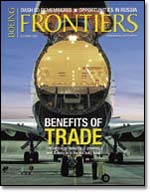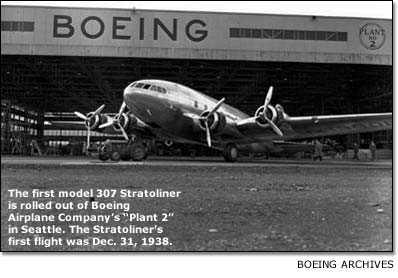
Parents as teachers
 In
the September 2003
issue, [Boeing Chairman and
CEO] Phil Condit in his My
View column (Page 5) makes
a cogent argument regarding
schools for the information
age. What he overlooked
is the most formative
years are from
birth to kindergarten,
in which much of the
desire for learning can be
stimulated by the mother
and father interacting
with a child. The parental
role is critical to creating
a thirst for knowledge,
and often parents
are too busy doing their
own thing to care. In
the September 2003
issue, [Boeing Chairman and
CEO] Phil Condit in his My
View column (Page 5) makes
a cogent argument regarding
schools for the information
age. What he overlooked
is the most formative
years are from
birth to kindergarten,
in which much of the
desire for learning can be
stimulated by the mother
and father interacting
with a child. The parental
role is critical to creating
a thirst for knowledge,
and often parents
are too busy doing their
own thing to care.
Yes, a good teacher
can spark the interest in
a child, but I found while
serving as a custodian in
our local school district,
during a seven-year layoff
from Boeing, that teachers are
not as qualified as they used
to be. I more than once corrected
the spelling and grammar
of lessons that a recently
college-graduated teacher had
written on the chalkboard. The
seasoned teachers were better
educated and disciplined in
their profession.
— Robert Turner, Clinton, Wash.

A lesson remembered
I am disheartened by the
myopic and elitist attitude
toward non-degreed managers
expressed by letter writer Carl
Dunn (August 2003, Page 7).
He must be unaware that the
founders of the very industry
that provides his employment,
Wilbur and Orville Wright,
did not even have high school
diplomas when they created
the aviation industry.
They were unfettered by
such thinking and allowed their true genius and entrepreneurship
to hold sway in
all their efforts. They had
extremely disciplined minds
and also knew when to turn
away from accepted thinking
and try a new direction.
As far as our industry
today, a competent manager
knows when to hire a person
with a degree if he or she
feels it is crucial to success of
a project, and no amount of
formal education can bestow
morals, judgment or competence
on anyone.
In the mid-1950s, I was
designing a special purpose
wind tunnel. At the time, I
only had rudimentary calculus
skills (which I was studying at
night school) and was struggling
with some complex airflow
calculations. My department
head came by and must
have seen something in my
look and asked what my problem
was. After I explained
myself he took me by the elbow and we went down the
hall to a room full of men
operating the old mechanical
calculators. He pointed in the
room and said, “Every one of
these guys knows calculus, but
not one of them can design a
wind tunnel. If you need help,
bring the problems here and
get back to designing.”
I have never forgotten that
lesson.
— Bill Hebestreit, Wofford
Heights, Calif.

Ethics matter
Marketing hype appears to
have reached new heights in
Boeing Commercial Airplanes.
In particular, the Sept. 8 issue of Boeing
News Now contained an
announcement of the third and
last in a series of Web-based
ethics trainings. How ironic
that this notice appears in
the midst of yet another ethics-related concern for Boeing:
the possible conflict of interest
with the U.S. Air Force KC-767
tanker procurement process. To
the world looking at Boeing, it
may appear a cultural change is
required. We must all remember
that the actions of only a
few, or even one, can affect
the livelihoods of thousands
of other employees. We must
also bear in mind that only the
impression, or the potential, for
a conflict of interest or a procedural
violation may have severe
consequences.
The previous ethics training
format was changed to the
new “Star Trek” look. Boeing
was looking for a better
way to engage its employees,
but I doubt a cartoon is
really the appropriate training
medium for an issue so critically
important to all of us at Boeing. If Boeing wants
its employees and the outside
world to believe ethics
is really a serious issue, then
the company—at all levels of
management—must engage its
employees in meaningful and
relevant face-to-face discussions
about ethics. The future
of the company and our jobs
depend on it.
— Gordon W. Shaffer, Renton, Wash.

SPACEHAB’s right
touch
I would like to take an
opportunity to respond in part
to the remarks made by Vernie
Erwin in the October 2003
issue (Page 6) regarding the
SPACEHAB Program. This
is a commercial program, not
a government contract. It has always been our documented
policy since our initial
flight in June 1993 not to wear
gloves, unless specific experiment
directed, while handling
flight hardware.
— Keith Pierce, Cape Canaveral, Fla.

How about parochial schools?
This long-time Boeing
employee was proud to read
about our company’s education
initiatives. However, as a resident
of St. Louis, I was equally
disappointed to learn just how
public-education-centric these
initiatives are. How can a strategy
that professes to “enable all
children to succeed in a technological
global society” explicitly
ignore students in our private and parochial schools?
In this town, the number of
students attending private and
parochial schools is significant.
The St. Louis Archdiocese
is the largest single school
district. Our parochial schools
have the same needs as public
schools and serve the same
community of students, economic
and otherwise. They,
too, have challenges in teacher
and school-leader capability,
especially in science and
math.
Unlike public schools, parochial
schools don’t have the
benefit of compulsory tuition
support in the form of ever increasing
property taxes and
state and federal grants of every
kind. At the same time, the
“cost-effectiveness” of parochial
education in St. Louis is
self-evident. If [Boeing Chairman
and CEO] Phil Condit
and [Vice President, Community
and Education Relations]
Toni Bailey really are interested
in “knowing the community
and educational system” and
making the “most impact” with
“limited resources,” then St.
Louis (at least) requires an education
strategy that includes our
private and parochial schools.
— Bob Dowgwillo, St. Louis, Mo.

Stratoliner’s special
meaning
 What
a thrill it was for me to read Ellen
Whitford’s “Once More With Feeling” about the
Boeing 307 Stratoliner (September 2003, page
22). I always enjoy Frontiers, but this article has
special meaning for me. What
a thrill it was for me to read Ellen
Whitford’s “Once More With Feeling” about the
Boeing 307 Stratoliner (September 2003, page
22). I always enjoy Frontiers, but this article has
special meaning for me.
In 1943, I was a Pan American Airways Flight
Radio Officer based in Miami. I had the privilege
of flying several trips on the Flying Cloud,
as well as the Rainbow and Comet. I had been
flying on Army, Navy, and Royal Air Force navigation
training flights, as well as Pan Am commercial routes throughout the
1940s. In 1943, the
Stratoliners were used on flights from Miami to
Balboa, Canal Zone, via Kingston, Jamaica.
The Boeing 307 was my favorite of the airliners
we flew because in addition to the sumptuous
passenger accommodations, it had a magnificent
flight deck. No other contemporary aircraft
could begin to match its spacious crew area and
state-of-the-art equipment and instrumentation.
— Paul I. Waite, Viera,
Fla.

Wear the right Cape
Here’s a comment to an error
in the caption of the Saturn V
Apollo photograph on Page 8 of
the September 2003 edition.
In November 1963, President
Lyndon Johnson announced
that Cape Canaveral would
be renamed Cape Kennedy in
memory of President John F.
Kennedy and that the NASA
Launch Operations Center on
Merritt Island would be renamed
the John F. Kennedy Space Center.
The Air Force subsequently
changed the name of the Cape
Canaveral Missile Test Annex to
Cape Kennedy Air Force Station
in January 1964.
Ten years later, Florida Governor
Reubin Askew signed a
statute requiring that Cape Kennedy
be renamed Cape Canaveral.
The U.S. Board of Geographic
Names agreed to restore
the name of Cape Canaveral and
retain the NASA’s John F. Kennedy
Space Center designation.
The Air Force then changed
the name of their launch site
to Cape Canaveral Air Force
Station.
The caption below the photo
on Page 8 states that the rocket
lifts off from Cape Kennedy,
Fla. The only Apollo mission
ever flown from Cape Kennedy
was Apollo 7 on a Saturn
I vehicle. It was launched
on Oct. 11, 1968, and was the
last manned mission from the
Cape. There has never been a
launch of a Saturn V Apollo
from Cape Kennedy.
— Herman J. May, Titusville, Fla.

Letters guidelines
Boeing Frontiers provides the letters page for readers to state
their opinions. The page is intended to encourage an exchange of ideas
and information that stimulates dialogue on issues or events in the company
or the aerospace industry. The opinions may not necessarily reflect those
of The Boeing Company. Letters must include name, organization and a telephone
number for verification purposes. Frontiers may edit letters
for grammar, syntax and size.
|